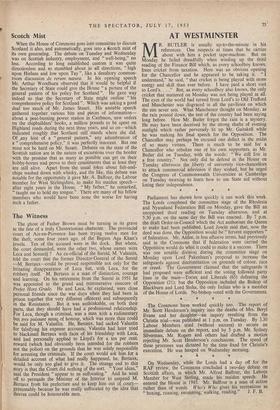M R. BUTLER is usually up-to-the-minute in his references. One suspects
at times that he carries about with him a pocket tape-machine. But on Monday he failed dreadfully when winding up the third reading of the Finance Bill which, as every schoolboy knows, frees cricket from taxation. Here was an obvious opening for the Chancellor and he appeared to be taking it. " I understand," he said, " that cricket is being played with more energy and skill than ever before. 1 have paid a short visit to Lord's. . .." But, as every schoolboy also knows, the only cricket that mattered on Monday was not being played at all. The eyes of the world had turned from Lord's to Old Trafford and Manchester was disgraced in all the pavilions on which the sun never sets. What Manchester thought on Monday, as the rain poured down, the rest of the country had been saying long before. How Mr. Butler forgot the rain is a mystery. He may have been deceived by the strong shafts of evening sunlight which rather perversely lit up Mr. Gaitskell while he was making his final speech for the Opposition. The Chancellor may perhaps be excused one defect in the midst of so many virtues. There is much to be said for a Chancellor who rebukes one of his own supporters, as Mr. Butler did on Tuesday, with the words : " We still live in a free country." Not only did he defend in the House on Tuesday afternoon the liberty of university vice-chancellors to attack commercial television if they wished, but he urged the Congress of Commonwealth Universities at Cambridge on Tuesday morning to learn how to use State aid without losing their independence. * * * * Parliament has shown how quickly it can work this week. The Lords completed the committee stage of the Rhodesia and Nyasaland Federation Bill on Monday, gave the Bill an unopposed third reading on Tuesday afternoon, and at 5.30 p.m. on the same day the Bill was enacted. By 7 p.m. the draft Order-in-Council which the Act authorises the Queen to make had been published. Lord Jowitt said that, now the deed was done, the Opposition would be " fervent supporters " of federation. Mr. Attlee, in less effusive terms, had previously said in the Commons that if federation were carried the Opposition would do what it could to make it a success. There was one notable division during the committee stage on Monday upon Lord Pakenham's proposal to increase the safeguards against discrimination on grounds of colour, race or creed. The Government claimed that the safeguards it had proposed were sufficient and the voting followed party lines in the main—Tories and Liberals (65) defeating the Opposition (21); but the Opposition included the Bishop of Blackburn and Lord Sinha, the only Indian who is a member of the House of Lords. No bishop voted with the Government.
*
The Commons have worked quickly too. The report of Mr. Scott Henderson's inquiry into the deaths of Mrs. Beryl Evans and her daughter—an inquiry resulting from the Christie trial—was published at 1 p.m. on Tuesday. By 3.30 Labour Members tried (without success) to secure an immediate debate on the report, and by 5 p.m. Mr. Sydney Silverman, Mr. Rogers and others had drafted a motion rejecting Mr. Scott Henderson's conclusions. The speed of these processes was dictated by the time fixed for Christie's execution. He was hanged on Wednesday morning.
On Wednesday, while the Lords had a day off for the RAF review, the Commons concluded a two-day debate on Scottish affairs, in which Mr. Alfred Balfour, the Labour Member for West Stirling, made his maiden speech. He entered the House in 1945.- 'Mr. Balfour •is a man of action rather than of words. Who's Who gives his recreations as " boxing, running, swimming, walking, reading." J. F. B.


























 Previous page
Previous page